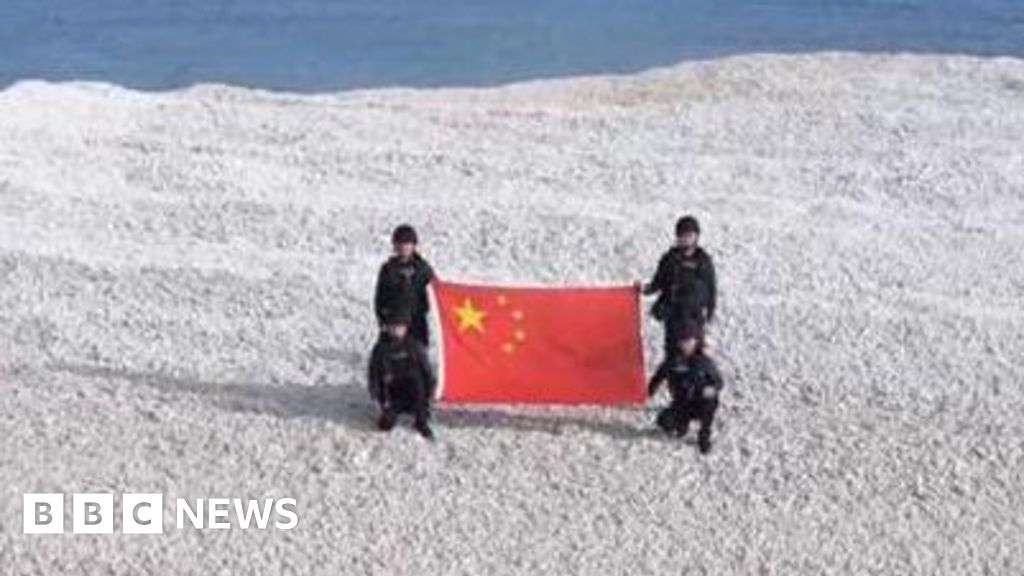Beijing's South China Sea Sandbank Grab: A New Geopolitical Flashpoint?
The South China Sea, a vital waterway teeming with resources and strategic importance, is once again simmering with geopolitical tension. China's recent actions, specifically its apparent expansion of features on several sandbanks within the disputed waters, have reignited concerns among neighboring countries and sparked international debate. Is this a mere assertion of sovereignty, or a prelude to further escalation and a significant new flashpoint?
China's Actions: A Closer Look
Reports suggest China has undertaken significant land reclamation and infrastructure development on several sandbanks in the Spratly Islands, a particularly contentious area within the South China Sea. These activities, which include the construction of new structures and the expansion of existing ones, have been observed via satellite imagery and confirmed by various independent sources. While China maintains these actions are for “civilian purposes,” such as fisheries and meteorological research, many see these activities as a direct challenge to the sovereignty claims of other nations in the region.
The Geopolitical Implications:
This latest move by Beijing carries significant geopolitical implications:
- Increased Militarization: The expanded features on these sandbanks could easily accommodate military infrastructure, significantly enhancing China's military presence and projection of power in the South China Sea. This could lead to a destabilizing arms race in the region.
- Escalation of Territorial Disputes: China's assertive actions directly challenge the overlapping claims of Vietnam, the Philippines, Malaysia, Brunei, and Taiwan. This heightens the risk of direct confrontation and further escalates existing tensions.
- Impact on Regional Trade: The South China Sea is a crucial trade route, carrying billions of dollars worth of goods annually. Increased militarization and instability could disrupt shipping lanes, impacting global trade and economies.
- International Law and the UNCLOS: China’s actions are widely viewed as a violation of the United Nations Convention on the Law of the Sea (UNCLOS), a treaty China is a signatory to. This defiance of international law further complicates the situation and undermines efforts towards peaceful resolution.
International Response and the Way Forward:
The international community has responded with a mixture of condemnation and cautious diplomacy. The United States, along with several other nations, has expressed concerns over China's actions and reiterated its commitment to upholding freedom of navigation in the South China Sea. However, finding a concrete and effective solution remains a challenge.
Several pathways could potentially de-escalate tensions:
- Strengthening Multilateral Dialogue: Renewed efforts towards diplomatic engagement and open dialogue between all claimant states are crucial. International forums and mechanisms, such as ASEAN, should be actively utilized to facilitate communication and find common ground.
- Enhancing Regional Cooperation: Building trust and cooperation on areas of shared interest, such as environmental protection and fisheries management, can contribute to a more stable and cooperative atmosphere.
- Upholding International Law: The international community must unequivocally reaffirm its commitment to upholding UNCLOS and other relevant international laws. This requires consistent pressure and a concerted effort to prevent further unilateral actions.
Conclusion:
China's expansion of features on South China Sea sandbanks represents a serious escalation in regional tensions and poses a significant geopolitical challenge. The potential for miscalculation and further conflict is real. The international community must work together to prevent further escalation and strive for a peaceful, diplomatic solution that respects international law and the sovereignty of all claimant states. This situation requires careful monitoring and proactive engagement to avoid a major crisis in the crucial South China Sea region. The future stability of the region hinges on effective diplomacy and a clear commitment to upholding international norms.

